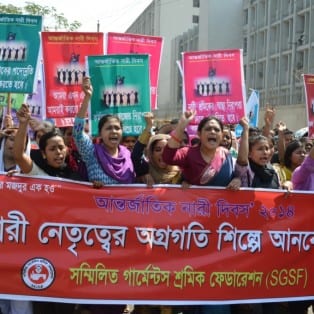The COVID-19 crisis is especially devastating for the 50 million workers who make clothes, shoes and textiles in factories around the world. With declining sales, corporate retailers are canceling orders and factories are laying off workers, most without pay. Those forced to work often must do so in unsafe factories to support themselves and their families. The majority of garment workers are women who are their family’s primary wage earner.
But through their unions, tens of thousands of garment workers in Bangladesh are successfully standing up to employers to ensure they are paid during plant closures and have proper protective equipment if they must report to work.
In Gazipur, factory-level unions and worker union leaders representing 10,000 garment workers at Hop Lun Ltd. factories negotiated key pay and safety measures. Workers will receive their full month’s salary for March as the factory closes from March 26–April 5 during the government lockdown. When they are back on the job, they will have access to hotlines to call if they are ill and need guidance. The phone numbers of the union president and top management also are available so workers can directly access assistance in case of emergency.
The Sommilito Garments Sramik Federation (SGSF) union had recently negotiated a collective bargaining agreement with Hop Lun Ltd. factories that includes a 10 percent annual pay increase.
At Natural Denims Ltd., where some 8,200 workers signed a collective bargaining agreement in January, SGSF worked with factory management to ensure workers receive their full pay during the factory closure. Management also has established a 10-member committee of union members and management volunteers who will assist workers who become ill or face any emergency during the closure, and are developing plans to address worker safety in coming months.

